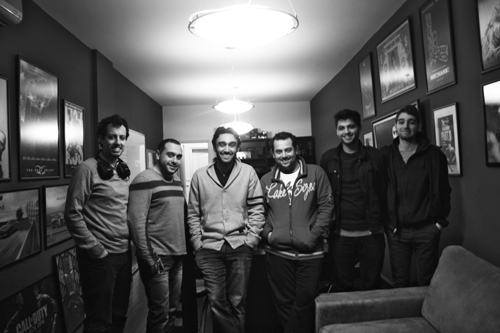Three Lebanese entrepreneurial companies, Mosaic Marble, At7addak and ElementN, have been added to the network of New York-based Endeavor, the nonprofit organization supporting established entrepreneurs in emerging markets. The selection, which took place in London in June, saw a total of 17 high-impact entrepreneurs from Brazil, Columbia, Jordan, Lebanon, Mexico and Uruguay added to the network, bringing the total number of entrepreneurs supported by Endeavor to 443 in 13 emerging markets. Lebanon, which along with Mexico saw the highest number of companies selected, now has seven entrepreneurs on Endeavor’s network after four companies were selected last year, the organization’s first year of operation in the country. To understand what each company has to offer and their strategy going forward, Executive sat with the founders, Taline Assi of Mosaic Marble, Brahms Chouity of At7addak and Rabih Nassar of ElementN.
Challenging the gamers
If Mark Zuckerberg [chief executive of Facebook] could do it, why couldn’t I? This little kid is younger than me,” says Brahms Chouity, founder of At7addak.com (which means “I challenge you” in Arabic).
Chouity says he was inspired to start the dot-com company in February 2011. At that time he was bumming around playing video games, on sabbatical with his pregnant wife, away from their hectic lifestyle managing several companies. But Chouity’s new hobby became too much for his wife to handle: “This can’t continue; either you stop playing or you make a business out of it,” she said, and that’s when he got the idea to set up At7addak.com, a social platform for gamers in the Arab world where they can challenge each other to earn points and cash through online tournaments. Chouity’s prior expertise was in the hospitality industry, so with no experience setting up a dot-com company, he went about hiring the smartest kids on the block, selecting top graduates from Lebanon’s universities, or “the lifeblood of the company” he says. The 11 employees of At7addak own 10 percent of the stock options, a percentage Chouity intends to eventually raise as “these guys own the concept; I support them to grow.”
Once the smart kids got on board, the dot-com startup spent several months building a unique gaming software, which links all consoles and computers to the At7addak system. Here’s how it works: you open an account on At7addak’s website free of charge, link your PlayStation or Xbox by inputting the ID of your console and bam! You are linked. You can challenge players across the Arab world — the At7addak platform covers 15 games now, including big hits such as FIFA and Call of Duty — and your score is automatically updated to the website.
The online startup had 50,000 registered users as of July, 10 million viewers on their website per month and 200,000 fans on their Facebook page, the second highest number of fans of any website in the Middle East. At7addak also publishes articles in English and in Arabic covering new releases of games, previews of upcoming games and testing of electronics; think of it as the CNET.com of the gaming industry.
Playing for revenue
With no subscription fees, the company makes money through sponsorships of its tournaments. Its clients are made up of high profile names: American video game developer Electronic Arts, Swiss provider of PC accessories Logitech, American semiconductor company Advanced Micro Devices (AMD) and video console provider PlayStation ME. For this year, At7addak is expected to rack in some $700,000 in revenues from these sponsorship deals. “[It’s] a subtle way of pushing a brand,” says Chouity. “While these gamers are doing the thing they are most passionate about, in the middle of game, they get a video of a new tournament with the brand of a [sponsor].”
Going forward, however, Chouity aims to diversify the company’s revenue sources. He plans an increase in advertisement on their website and product placements by their staff who, through the broadcasting of video news covering games, should eventually become “icons” for gamers in the region. A store selling At7addak branded products, as well as promoted games and gaming accessories, is also on the agenda. Eventually a premium membership, giving additional benefits, should become an added source of income, but that’s for later. “I don’t want to charge any of the users until the free service is absolutely spotless,” says Chouity.
A good headstart
With a potentially lucrative business model, which is “light to manage”, other hungry entrepreneurs could start to imitate. “We need to grow as quickly as possible before anyone else does the same thing, as anyone with time and resources can replicate our automated software,” says Chouity. His big dream is to create the ‘Arab Gaming League’, a ‘Star Academy’ for gamers who would represent their countries and play against each other. Eventually, he sees the online company building a social platform catered to different countries — a local At7addak for Turkey, Asia, North America, etcetera — and linking the different platforms to each other. “That’s huge, that’s world domination,” says Chouity.
With the new sources of revenues slated to start pouring in next year, Chouity expects the company to generate a “realistic” $3 million in 2013, and then grow by an annual 25 percent. Entirely self-funded for now, he does not intend on raising capital at least for the next year or two. Eventually, Chouity says he would consider the sale of a stake or even the entire company to a strategic partner who would “come in and explode it.” He will not be considering venture capitalists — Chouity has already had several offers especially after being selected by Endeavor, a non-profit nongovernmental organization that supports high impact entrepreneurs in emerging markets — but he would be interested in selling to a larger regional company in the same industry. “If the offer is good and they want to take us over completely, I wouldn’t oppose. I’ve already got my next venture prepared,” says Chouity.







![CAT_Picture11[1]](https://www.executive-magazine.com/wp-content/uploads/2014/01/CAT_Picture111.gif)


